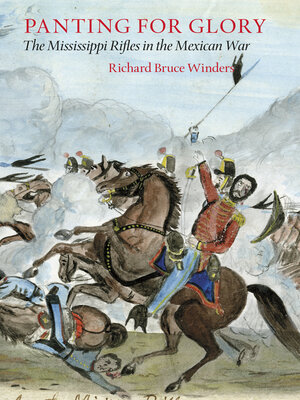Panting For Glory
ebook ∣ The Mississippi Rifles in the Mexican War · Williams-Ford Texas A&M University Military History Series
By Richard Bruce Winders

Sign up to save your library
With an OverDrive account, you can save your favorite libraries for at-a-glance information about availability. Find out more about OverDrive accounts.
Find this title in Libby, the library reading app by OverDrive.



Search for a digital library with this title
Title found at these libraries:
| Library Name | Distance |
|---|---|
| Loading... |
Armed with percussion rifles when most other US soldiers still carried flintlock muskets, the "Mississippi Rifles" served in the war against Mexico that followed the annexation of Texas in 1845. In Panting for Glory: The Mississippi Rifles in the Mexican War, Richard Bruce Winders skillfully uncovers the contrasting wartime experiences of two regiments, the 1st and 2nd Mississippi Rifles.
The 1st Mississippi Rifles were lauded for their service and remain a familiar part of the history of the Mexican War. Under the leadership of Col. Jefferson Davis—later the President of the Confederate States of America—the 1st enjoyed significant victories at the Battle of Buena Vista and the Battle of Monterey. The 2nd Mississippi Rifles, by contrast, saw little action and returned home overlooked and largely forgotten.
Panting for Glory compares these regiments to show that the contours of history were sometimes arbitrary and that military historians, in their analysis of failure, should take into account a wide range of factors that influence outcomes, not merely records of wins and losses. As Winders concludes, "the 1st and 2nd Mississippi Rifles . . . offer the perfect opportunity to examine two sides of war: glory gained and glory denied."
The 1st Mississippi Rifles were lauded for their service and remain a familiar part of the history of the Mexican War. Under the leadership of Col. Jefferson Davis—later the President of the Confederate States of America—the 1st enjoyed significant victories at the Battle of Buena Vista and the Battle of Monterey. The 2nd Mississippi Rifles, by contrast, saw little action and returned home overlooked and largely forgotten.
Panting for Glory compares these regiments to show that the contours of history were sometimes arbitrary and that military historians, in their analysis of failure, should take into account a wide range of factors that influence outcomes, not merely records of wins and losses. As Winders concludes, "the 1st and 2nd Mississippi Rifles . . . offer the perfect opportunity to examine two sides of war: glory gained and glory denied."







